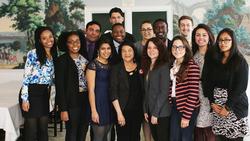News
Activist Dolores Huerta speaks at VCLS
By Gabriella Sanes ’16
May 1, 2015
Following its trend of bringing impressive people of color, the Voices of Color Lecture Series (VCLS) brought Dolores Huerta to Hamilton on Friday April 24. Founded by Christine Johnson, the former director of Hamilton College Higher Education Opportunity Programs, VCLS is a student-run organization whose purpose is exposing students to the many contributions of people of color. Huerta is a cofounder of the United Farm Workers, recipient of the Medal of Freedom Award, the Eleanor D. Roosevelt Human Rights Award and United States Presidential Award.
Huerta has proven instrumental as a labor leader and civil rights activist, highlighting the prevalent social issues concerning our world today and passionately advocating for change.
She spoke on her work in the ’60s as a leader and activist, organizing farm workers and spearheading the infamous national boycott of grapes that led to some of the country’s first farm worker contracts. Huerta pushed to raise wages and improve working conditions for thousands. The impact her work has had was finally recognized when she received the highest civilian honor in the U.S., the Medal of Freedom Award. Even with her many achievements, Huerta shared her concerns that there is still work to be done.
Huerta touched on the growing concern of immigration and the inability of certain people to accept that we are all just human beings. She noted that immigrants have been the scapegoats for many of society’s issues. All they, and their supporters, want is a clear, legal pathway to citizenship through legislation. She remarked that apart from Native Americans, everyone that has been in this country has been legalized at one point or another, every single person.
Encouraging students to vote for legalization for all the undocumented persons in this country, Huerta reminded us that everyone’s family came from somewhere. America is a land of immigrants and to deny immigrants a right to legalization is wrong, unjust and contrary to the very principles that made this country possible.
Interestingly, she claimed that “culture wars,” the attacks on feminist movements, gay and LGBTQ movements, minorities and immigrants, are a means of distracting the country from the real issues which are economic in nature. She raised the current issue of the minimum wage, referencing the current “Fight for $15” mass protests that have sparked across the nation. Huerta asserted that the minimum wage should actually be about $30 an hour in order to keep up with the standard of living in this country.
Huerta argued that the U.S. government takes advantage of its people; therefore, it should be no surprise that it takes advantage of other countries. In what she called “economic colonization,” Huerta pointed out that because the United States fails to have any natural resources of its own, it chooses to exhaust the resources of other countries, devastating their economies, all for the sake of profit.
Like Gandhi and Dr. Martin Luther King Jr., she encouraged the positive change that comes through nonviolence and stressed that we all have powers as individuals.
Huerta claimed that in government, the voices of women and minorities are repeatedly silenced because they are widely underrepresented.
She also acknowledged student concerns on whether actual change can occur in a system many deem unjust. She urges students to not give up, to take action, develop as leaders and become actively involved at the local level. She suggested getting involved in local branches of government, school boards and city councils because only then will real change happen.
Dolores Huerta is currently the president of the Dolores Huerta Foundation, which she founded, and she continues to work for change on behalf of social justice, civil rights and equality.
At the end of the lecture, Huerta shared her secrets to success. She said that change can only begin when people realize they have power and that in fact, the power is in their person. By organizing the workers and working together, the people can recognize their power and that is how real change is made. Huerta reassured students that change is possible as long as we believe we can do it, leaving us with “Si se puede,” “Yes we can.”





